初中英语常用动词习惯用法总结
初一动词用法

初一动词用法对于初一的同学来说,掌握动词的用法是英语学习中的一个重要环节。
动词在句子中起着关键的作用,它不仅能够表达动作,还能反映时态、语态和语气等。
下面,咱们就来详细说一说初一阶段常见的动词用法。
首先,咱们得了解动词的基本分类。
动词可以分为实义动词、系动词、助动词和情态动词。
实义动词是表示具体动作的词,比如“run(跑)”“eat(吃)”“read (读)”等等。
实义动词又可以分为及物动词和不及物动词。
及物动词后面可以直接跟宾语,像“eat an apple(吃一个苹果)”中的“eat”就是及物动词,“apple”就是宾语。
而不及物动词后面不能直接跟宾语,如果要加宾语,得先加上介词,比如“look at the blackboard(看黑板)”中的“look”就是不及物动词,要加上“at”才能跟宾语“the blackboard”。
系动词呢,它主要是用来连接主语和表语,说明主语的状态、性质、特征等。
初一常见的系动词有“be(am/is/are)”“look(看起来)”“sound(听起来)”“taste(尝起来)”“feel(感觉起来)”等等。
比如“She is happy(她很开心。
)”“The music sounds nice(这音乐听起来不错。
)”助动词主要是用来帮助构成各种时态、语态和语气。
初一阶段常见的助动词有“do/does”“have/has”。
“do/does”用于一般现在时的否定句和疑问句中,比如“Don't eat in class(不要在课堂上吃东西。
)”“Does he like sports?(他喜欢运动吗?)”“have/has”用于现在完成时,比如“I have finished my homework(我已经完成了我的作业。
)”情态动词表示说话人的语气和态度,常见的有“can(能,会)”“could(能,会,是 can 的过去式)”“may(可以)”“might(可以,是 may 的过去式)”“must(必须)”等。
初中常用动词用法

初中常用动词用法在初中英语学习中,动词的用法至关重要。
掌握常用动词的用法,对于提高英语语言能力有着举足轻重的作用。
接下来,让我们一起深入探讨一下初中常用动词的用法。
一、be 动词be 动词包括 am、is、are,其用法较为基础却又十分重要。
当主语是第一人称 I 时,用 am。
例如:“I am a student”(我是一名学生。
)当主语是第三人称单数(he、she、it 或单个的人或物)时,用 is。
比如:“He is my friend”(他是我的朋友。
)“The book is interesting”(这本书很有趣。
)当主语是第二人称 you 或者复数名词(we、they 或两个及以上的人或物)时,用 are。
例如:“You are very kind”(你很友善。
)“They are my classmates”(他们是我的同学。
)二、实义动词实义动词是表示具体动作或状态的动词,比如:run(跑)、eat (吃)、sleep(睡觉)等。
1、及物动词与不及物动词及物动词后面可以直接跟宾语,表达完整的意思。
例如:“I read a book”(我读一本书。
)“read”就是及物动词,“book”是宾语。
不及物动词后面不能直接跟宾语,如果要接宾语,需要加上相应的介词。
比如:“He arrived at the station”(他到达了车站。
)“arrive”是不及物动词,“at the station”是地点状语。
2、动词的时态一般现在时:表示经常发生的动作或存在的状态。
主语是第三人称单数时,动词要进行相应的变化,一般在动词末尾加 s 或 es。
例如:“She studies hard”(她学习努力。
)现在进行时:表示正在进行的动作,结构是“be +动词的现在分词”。
例如:“They are playing football”(他们正在踢足球。
)一般过去时:表示过去发生的动作,动词要用过去式。
初中英语常用动词习惯用法总结
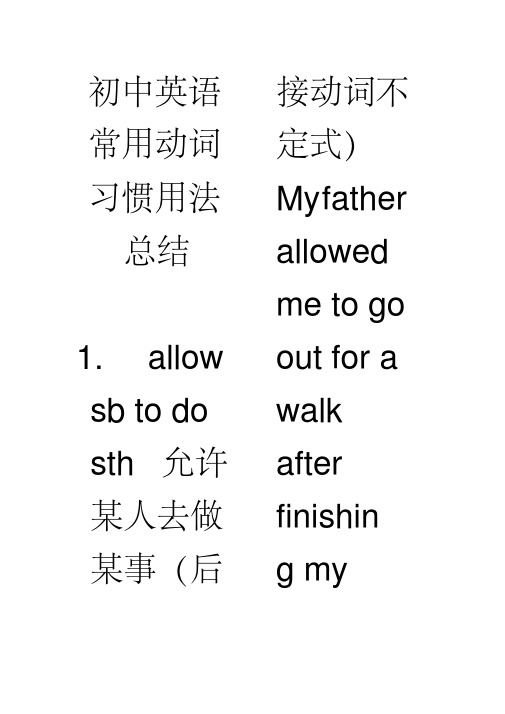
I am
was busy busy with
washing my work.
my car at 8. be
that time. coming/g
那时候我 oing/lea
正忙于清 ving/fiy
洗我的车 ing/movi
子。
ng/dying
(某些位
移动词用
进行时态 时表将 来) the bus is coming/t he dog is dying. 9. be excited to do sth
have a
afraid to
dinner
ask me
with them question
yesterday s.
.
4. be sth 害
afaid of 怕某物
doing sth He is
害怕做某 afraid of
事
snakes.
I am
6. be
afraid of amazedto
going out do sth
28.
29. get
让某人做 /have a
某事(后接 chance to
动词原形) do sth
get sb to 得到一个
do sth
做某事的
make 机会
sb do sth 30. giv
e/pass/s
how/lend /sell sb sth/sth to sb
ed in
We are
Chinese. ready for
13.
the exam.
be/get
Be ready
ready
to do sth
for/to do 为做某事
初中英语语-动词详解

与主语在数上一致
He writes well. 第三人称单数
时态
表示动作发生的时间
He wrote a letter to me last month. 过去时态
语态
主语是动作的发生者或者承受者
We study English.主动 The road was filled with rubbish. 被动
②与表示时间或条件的状语从句连用。If you ask him, he will help you.
③ 用于"I expect, I'm sure, I think, I wonder + 宾语从句"中。 I don't think the test will be very difficult.
3.一般将来时
不能独立做谓语,跟主要动词构成谓语,表示疑问,否定及各种时态
He doesn’t speak Chinese. I am watching TV.
情态动词 (mod. v.)
跟动词原形(有自己的词汇意思)
不能独立做谓语。表示说话人语气、情态,无人称和数的变化
We can do it by ourselves. That would be better.
6.现在完成时
A)选用have, has填空: 1.I _______ told him the news. 2.She ________ come back from school. 3.You ________ won the game.
一、按词义和句中的作用,动词可以分为四类
构成方式
举例
动词+介词
Look at, look after
初中英语动词用法分类

初中英语动词用法分类在初中英语的学习中,动词是至关重要的一部分。
掌握动词的用法,对于理解句子结构、准确表达意思以及提升英语语言能力都有着关键作用。
接下来,让我们一起对初中英语动词的用法进行分类和探讨。
一、实义动词实义动词是表示具体动作或状态的动词,能够独立作谓语。
1、及物动词及物动词后面需要接宾语,才能完整地表达一个动作。
例如,“I love English” 中的“love”就是及物动词,“English”是它的宾语。
常见的及物动词有“eat”(吃)、“read”(读)、“write”(写)等。
2、不及物动词不及物动词后面不需要接宾语就能表达完整的意思。
比如,“The bird flies” 中的“flies”就是不及物动词。
常见的不及物动词有“come”(来)、“go”(去)、“sleep”(睡觉)等。
二、系动词系动词用于连接主语和表语,表示主语的身份、性质、状态等。
常见的系动词有:1、 be 动词(am/is/are/was/were)这是最常见的系动词,例如,“I am a student”2、感官动词如 look(看起来)、sound(听起来)、smell(闻起来)、taste (尝起来)、feel(感觉起来)。
例如,“The flower smells sweet”3、表示变化的动词如 become(变得)、get(变得)、grow(生长,变得)、turn(变得)等。
比如,“It gets colder and colder”三、助动词助动词主要用于构成各种时态、语态、语气等。
常见的助动词有:1、 do/does/did用于一般现在时和一般过去时的否定句和疑问句中。
例如,“Do you like music?” “He doesn't like sports” “Did she go to the party?”2、 have/has/had用于构成现在完成时和过去完成时。
如,“I have finished my homework” “They had left before I arrived”3、 be 动词(am/is/are/was/were)用于进行时态和被动语态。
初一英语常见动词用法

初一英语常见动词用法在初一英语的学习中,动词是非常重要的一部分。
掌握常见动词的用法,对于我们正确理解和运用英语句子至关重要。
接下来,让我们一起了解一些初一英语中常见动词的用法。
一、be 动词(am/is/are)be 动词可以说是英语中最基础、最常用的动词之一了。
“am”用于第一人称单数“ I ”,例如:“I am a student ”(我是一名学生。
)“is”用于第三人称单数,比如:“He is tall ”(他很高。
)“She is my friend ”(她是我的朋友。
)“The book is interesting ”(这本书很有趣。
)“are”用于第二人称单数“you”以及复数人称,像:“You are nice ”(你很好。
)“We are happy ”(我们很开心。
)“They are in the classroom ”(他们在教室里。
)在使用 be 动词时,要注意主语的人称和单复数,保持一致。
二、have/has“have”表示“有”,用于第一人称(I、we)、第二人称(you)以及复数人称(they 等)。
例如:“I have a pen ”(我有一支笔。
)“They have many books ”(他们有很多书。
)“has”则用于第三人称单数(he、she、it),比如:“He has a dog ”(他有一只狗。
)“She has a beautiful dress ”(她有一条漂亮的裙子。
)三、like“like”意思是“喜欢”,常见的用法有:1、 like +名词,例如:“I like apples ”(我喜欢苹果。
)2、 like + doing sth ,表示喜欢做某事,强调习惯和爱好,比如:“He likes playing football ”(他喜欢踢足球。
)3、 like + to do sth ,表示偶尔或具体某次喜欢做某事,例如:“She likes to swim today ”(她今天喜欢游泳。
初中英语动词及其用法
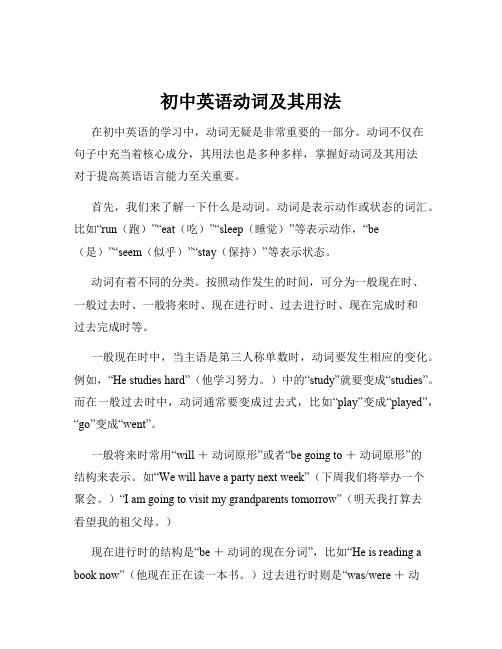
初中英语动词及其用法在初中英语的学习中,动词无疑是非常重要的一部分。
动词不仅在句子中充当着核心成分,其用法也是多种多样,掌握好动词及其用法对于提高英语语言能力至关重要。
首先,我们来了解一下什么是动词。
动词是表示动作或状态的词汇。
比如“run(跑)”“eat(吃)”“sleep(睡觉)”等表示动作,“be(是)”“seem(似乎)”“stay(保持)”等表示状态。
动词有着不同的分类。
按照动作发生的时间,可分为一般现在时、一般过去时、一般将来时、现在进行时、过去进行时、现在完成时和过去完成时等。
一般现在时中,当主语是第三人称单数时,动词要发生相应的变化。
例如,“He studies hard”(他学习努力。
)中的“study”就要变成“studies”。
而在一般过去时中,动词通常要变成过去式,比如“play”变成“played”,“go”变成“went”。
一般将来时常用“will +动词原形”或者“be going to +动词原形”的结构来表示。
如“We will have a party next week”(下周我们将举办一个聚会。
)“I am going to visit my grandparents tomorrow”(明天我打算去看望我的祖父母。
)现在进行时的结构是“be +动词的现在分词”,比如“He is reading a book now”(他现在正在读一本书。
)过去进行时则是“was/were +动词的现在分词”,“They were playing football at that time”(那时他们正在踢足球。
)现在完成时的结构是“have/has +过去分词”,“I have finished my homework”(我已经完成了我的作业。
)过去完成时是“had +过去分词”,“By the end of last year, we had learned 2000 words”(到去年年底,我们已经学了 2000 个单词。
英语复习常用动词习惯用法

英语复习常用动词习惯用法常用动词习惯用法大家有知道的吗?如果没有,可以看小编总结的哦!接下来,小编给大家准备了英语复习常用动词习惯用法,欢迎大家参考与借鉴。
英语复习常用动词习惯用法常用动词习惯用法1. allow1 sb to do sth 允许某人去做某事(后接动词不定式)My father allowed3 me to go out for a walk after finishing my homework.2. asked sb (not) to do sth 叫某人做事某事(叫某人不要去做某事)My father asked me to study hard.He asked me not to swim alone4.be asked to do sth 被叫去做某事/被邀请去做某事I was5 asked to have a dinner with them yesterday.3. be afraid to do sth 害怕做某事She is afraid to ask me questions.4. be afaid of doing sth 害怕做某事I am afraid of going6 out at night.5. be afaid of sth 害怕某物He is afraid of snakes.6. be amazed7 to do sth 对做某事感到惊讶He was amazed to meet the girl there.be amazed at sth 对某事感到惊讶they were amazed at the news8.7. be busy doing/with sth 忙于做某事(常考)e2.g: I was busy washing9 my car at that time. 那时候我正忙于清洗我的车子。
I am busy with my work.8. be coming/going/leaving/fiying/moving/dying10(某些位移动词用进行时态时表将来)the bus is coming/the dog is dying.9. be excited11 to do sth 对做感到兴奋Jacky was excited to travel12 there by plane.be excited at sthLily13 was excited at his words.be excited about doing sthhe was excited about passing the exam14 without going overing books.10. be frightened15 to do sth 害怕去做某事Sam is frightened to ride a horse.11. be glad/happy to do sth 高兴去做某事she is happy to clean the blackboard with me.be pleased16 to do sth高兴做某事she was pleased to help the old man yesterday.be pleased with sth 对某事感到高兴/满意the teacher was pleased with my answer.12. be interested17 in sth/doing sth 对某事感兴趣/对做某事感兴趣she is interested in swimming in the river.My btother is interested in Chinese.13. be/get ready for/to do sthBe ready for sth 为某事做好了准备We are ready for the exam.Be ready to do sth 为做某事做好了准备We are ready to have a birthday party for her.get ready for sth为某事在做准备We are getting ready for the exam.get ready for sth 为做某事而做准备13. be sorry to do sth 对做某事感到抱歉14. be surprised18 to do sth 对做某事感到惊奇be surprised at sth 对某事感到惊奇15. be worth19 doing sth 值得做某事(worth 后接动词-ing 形式,常考)16. begin to do sthbegin/start to do/doing sth ( 开始去做某事)17. can/be able20 to afford21 (to buy) sth 有能力购买(供)18. can/may/must do sth could/would22/should/might do sth19. cant wait to do sth 迫不急待地去做某事20. decide23 to do sth 决定去做某事make up ones mind24 to do sth 下决心去做某事(常考)make a decision25 to do sth 对做某事作出决定21. deserve26 to do sth 值得/应该做22. encourage27 sb to do sth 鼓励某人去做某事23. enjoy doing sth 乐意去做某事24. expect28 (sb) to do sth 期望去做某事25. fail29 to do sth 做某事失败succeed30 doing sth 成功做了某事26. finish doing sth 做完某事(后接动词-ing形式)(常考)27. follow sb to do sth 跟随某人去做某事28. get sb to do sthmake sb do sthlet sb do sth (让某人做某事(后接动词原形))29. get/have a chance31 to do sth 得到一个做某事的机会30. give/pass/show/lend/sell sb sth/sth to sbbuy/get/bring sb sth/sth for sb31. go on to do sth 继续做事(常考)go on doing sth 继续做事(常考)32. hate32 to do/doing sth 讨厌/不喜欢做某事33. have fun doing sth34. have problems33 doing sth 做某事遇到困难35. have sb do sthhave sth donehave sth to do 工有事要做36. hear sb do sth 听到某人做某事(后接动词原形,常考)hear sb doing sth 听到某人正在做某事(常见)37. help to do sth 帮忙做某事help sb (to) do sth 帮助某人做某事38. hope/wish to do sth 希望做某事wish sb to do sth 希望某人做某事39. I t seems35 that 这像是(后接从句)seem34 to do sthseem +adj40. Its + adj+(for sb) to do sth .Its+adj +(of sb) to do sthe.g: Its glad for him to hear the news.41. It takes sb some time/money to do sth . 花费某人多长时间做某事(常考)42. pay36 for cost37 spendon.. it take to do sth43. Its best for sb to do sth. 对某人来说做某事是最好的had38 better do sth 最好做某事(注意had没有时态和人称的变化,better后接动词原形)44. Its time for sb to do sth 是某人做某事的时候了45. keep (on)doing sth 坚持做某事(常考)keep sb doing sth 让某人做某事(常考)keep sb from doing sth 阻止某人做某事(常考)keep sb/sth +adjkeep the book for 2 days 借这本书两天(不要用borrow或lend)46. learn to do sth 学做某事learn sth from sb 向某人学习47. like to do/doing sth 喜欢做某事like sb to do sth 喜欢某人做某事48. need to do sthneed doing sth/to be doneneed sth neednt do sth(需要做某事)49. prefer39 to do sth rather40 than do sth 宁愿而不愿(常考)prefer doing sth to doing sth 喜欢做胜过做e.g: I prefer reading41 books to going shopping. 比起购物来,我更爱读书。
初中常用动词用法总结
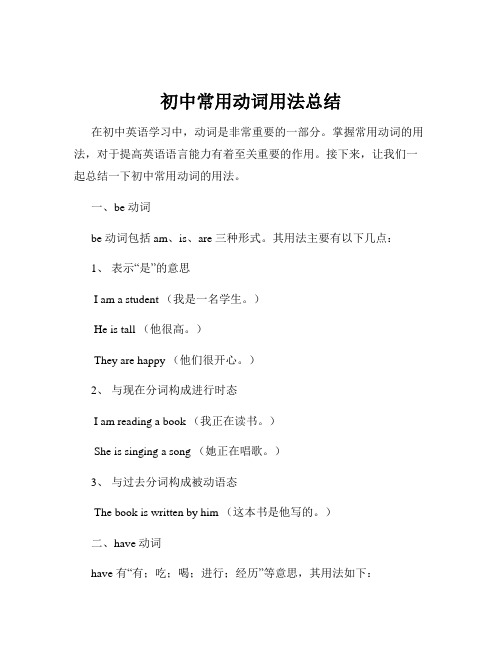
初中常用动词用法总结在初中英语学习中,动词是非常重要的一部分。
掌握常用动词的用法,对于提高英语语言能力有着至关重要的作用。
接下来,让我们一起总结一下初中常用动词的用法。
一、be 动词be 动词包括 am、is、are 三种形式。
其用法主要有以下几点:1、表示“是”的意思I am a student (我是一名学生。
)He is tall (他很高。
)They are happy (他们很开心。
)2、与现在分词构成进行时态I am reading a book (我正在读书。
)She is singing a song (她正在唱歌。
)3、与过去分词构成被动语态The book is written by him (这本书是他写的。
)二、have 动词have 有“有;吃;喝;进行;经历”等意思,其用法如下:1、表示“有”I have a pen (我有一支笔。
)They have many friends (他们有很多朋友。
)2、表示“吃;喝”Have some bread (吃点面包。
)Have a cup of tea (喝杯茶。
)3、与过去分词构成完成时态I have finished my homework (我已经完成了作业。
)三、do 动词do 用作实义动词时,表示“做;干”,用作助动词时,用于构成疑问句和否定句。
1、实义动词Do your homework (做你的作业。
)She does the dishes (她洗碗。
)2、助动词Do you like English? (你喜欢英语吗?)I don't know (我不知道。
)四、make 动词make 常见的意思有“制作;使;让”。
1、表示“制作”Make a cake (做一个蛋糕。
)2、表示“使;让”Make me happy (让我开心。
)五、take 动词take 有“拿;取;带走;花费”等意思。
1、表示“拿;取”Take this book (拿这本书。
初中动词的用法归纳
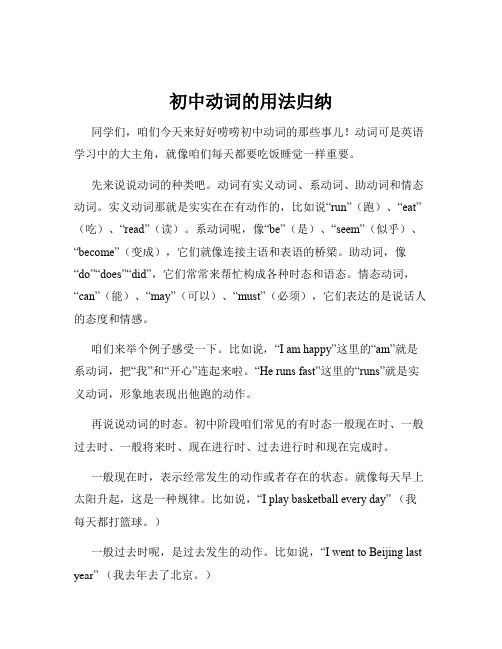
初中动词的用法归纳同学们,咱们今天来好好唠唠初中动词的那些事儿!动词可是英语学习中的大主角,就像咱们每天都要吃饭睡觉一样重要。
先来说说动词的种类吧。
动词有实义动词、系动词、助动词和情态动词。
实义动词那就是实实在在有动作的,比如说“run”(跑)、“eat”(吃)、“read”(读)。
系动词呢,像“be”(是)、“seem”(似乎)、“become”(变成),它们就像连接主语和表语的桥梁。
助动词,像“do”“does”“did”,它们常常来帮忙构成各种时态和语态。
情态动词,“can”(能)、“may”(可以)、“must”(必须),它们表达的是说话人的态度和情感。
咱们来举个例子感受一下。
比如说,“I am happy”这里的“am”就是系动词,把“我”和“开心”连起来啦。
“He runs fast”这里的“runs”就是实义动词,形象地表现出他跑的动作。
再说说动词的时态。
初中阶段咱们常见的有时态一般现在时、一般过去时、一般将来时、现在进行时、过去进行时和现在完成时。
一般现在时,表示经常发生的动作或者存在的状态。
就像每天早上太阳升起,这是一种规律。
比如说,“I play basketball every day” (我每天都打篮球。
)一般过去时呢,是过去发生的动作。
比如说,“I went to Beijing last year” (我去年去了北京。
)一般将来时,表示将来要发生的动作。
“I will go to Shanghai tomorrow” (我明天要去上海。
)现在进行时,正在进行的动作。
“He is reading a book now” (他现在正在读书。
)过去进行时,过去某个时刻正在进行的动作。
“I was watching TV at8 o'clock yesterday” (昨天八点我正在看电视。
)现在完成时,过去发生的动作对现在造成的影响或结果。
“I have finished my homework” (我已经完成了作业。
(完整版)动词用法总结

(完整版)动词用法总结动词用法总结动词是语言中最基本的词类之一,用于描述动作、状态或发生的事件。
在英语中,动词的用法非常多样化,因此了解和掌握不同动词的用法是非常重要的。
以下是一些常见的动词用法总结:一般现在时 (Simple Present)- 表示经常性、惯性的动作或事实。
- 例句:He plays tennis every Saturday.(他每个星期六打网球。
)现在进行时 (Present Continuous)- 表示正在进行的动作。
- 例句:She is reading a book right now.(她正在看书。
)一般过去时 (Simple Past)- 表示过去发生的动作或事实。
- 例句:They visited their grandparents last weekend.(他们上个周末去探望了他们的祖父母。
)过去进行时 (Past Continuous)- 表示过去某一时刻正在进行的动作。
- 例句:I was studying when she called.(她打电话时,我正在研究。
)一般将来时 (Simple Future)- 表示将来要发生的动作或状态。
- 例句:We will go on vacation next month.(我们下个月要去度假。
)祈使句 (Imperative)- 表示命令、建议或请求。
- 例句:Please close the door.(请关上门。
)现在完成时 (Present Perfect)- 表示过去发生的动作对现在的影响。
- 例句:I have finished my homework.(我完成了我的家庭作业。
)以上是一些常见的动词用法总结。
掌握这些用法可以帮助你更准确地使用动词,使你的语言表达更加流利和地道。
还有其他更复杂的动词用法,需要根据具体语境进行学习和掌握。
动词习惯用法
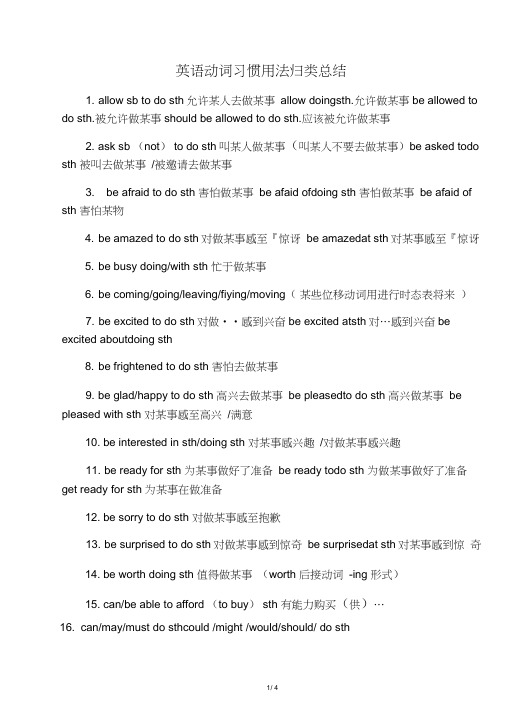
英语动词习惯用法归类总结1. allow sb to do sth允许某人去做某事allow doingsth.允许做某事be allowed to do sth.被允许做某事should be allowed to do sth.应该被允许做某事2. ask sb (not) to do sth叫某人做某事(叫某人不要去做某事)be asked todo sth 被叫去做某事/被邀请去做某事3. be afraid to do sth 害怕做某事be afaid ofdoing sth 害怕做某事be afaid of sth 害怕某物4. be amazed to do sth对做某事感至『惊讶be amazedat sth对某事感至『惊讶5. be busy doing/with sth 忙于做某事6. be coming/going/leaving/fiying/moving(某些位移动词用进行时态表将来)7. be excited to do sth对做••感到兴奋be excited atsth对…感到兴奋be excited aboutdoing sth8. be frightened to do sth 害怕去做某事9. be glad/happy to do sth 高兴去做某事be pleasedto do sth 高兴做某事be pleased with sth 对某事感至高兴/满意10. be interested in sth/doing sth 对某事感兴趣/对做某事感兴趣11. be ready for sth 为某事做好了准备be ready todo sth 为做某事做好了准备get ready for sth 为某事在做准备12. be sorry to do sth 对做某事感至抱歉13. be surprised to do sth对做某事感到惊奇be surprisedat sth对某事感到惊奇14. be worth doing sth 值得做某事(worth 后接动词-ing 形式)15. can/be able to afford (to buy) sth 有能力购买(供)…16. can/may/must do sthcould /might /would/should/ do sth17. can ' t wait to do s迫不急待地去做某事18. complain( to sb) about sth(向某人)抱怨某事19. decide to do sth 决定去做某事decide on doingsth.make up one ' s mind to dosth 下决心去做某事make a decision to do sth对做某事作出决定20. deserve to do sth值得/应该做…21. e ncourage sb to do sth鼓励某人去做某事22. enjoy doing sth乐意去做某事23. expect (sb) to do sth 期望去做某事24. fail to do sth 做某事失败succeed in doingsth成功做了某事25. finish doing sth做完某事(后接动词-ing形式)26. follow sb to do sth跟随某人去做某事27. let sb do sth /make sb do sth /get sb to do sth让某人做某事28. get/have a cha nee to do sth得到一个做某事的机会29. give/pass/show/lend/sell sb sth/sth to sbbuy/get/bring sb sth/sthfor sb30. go on to do sth 继续做(另一件)事go on doingsth 继续做(同一件)事31. hate to do/doing sth 讨厌/不喜欢做某事32. have fun doing sth33. have trouble/problems doing sth 做某事遇到困难34. have sb do sth让某人做某事have sth done让某事被做have sth to do有事要做35. hear sb do sth听到某人做某事(后接动词原形)hear sb doingsth听到某人正在做某事36. .help (to) do sth帮忙做某事help sb (to) dosth帮助某人做某事37. hope/wish to do sth 希望做某事wish sb to dosth 希望某人做某事38」t seems that 这像是. 后接从句)seem to do sthseem +adj39.It 's + adj+(for sb) to do sth .It 's+adj +(of sb)to do sth40.It takes sb some time/money to do sth .花费某人多长时间做某事41.pay …for, ・cost, spend •…on •厂it take •…to do sth42.It ' s best for sb to do对t某人来说做某事是最好的had better(not) do sth 最好(不)做某事(注意had 没有时态和人称的变化, better 后接动词原形)43.It ' s time for sb to do是某人做某事的时候了44.keep (on)doing sth 坚持做某事keep sb doingsth让某人做某事keep sb from doing sth 阻止某人做某事keep sb/sth +adjkeep the book for 2 days 借这本书两天(不要用borrow 或lend)45.learn to do sth 学做某事learn sth from sb 向某人学习46.like to do/doing sth 喜欢做某事like sb to do sth 喜欢某人做某事47. something to eat/drink 一些吃/喝的东西48. spend some time (in)doing sth /on sth 花费时间做某事spend somemoneyon sth/doing sth 买 .. 花了多少钱49. sth is hard/difficult/easy to do .做好某事很难/容易50. .stop to do sth 停下来去做某事(另一件事)stop doing sth 停止做某事stop/keep/prevent sb from doingsth 阻止某人做某事51. suggest doi ng sth 建议做某事52. succeed in doi ng sth 成功做某事53. take turns to do sth 轮流做...54. tell sb (not) to do sth 叫某人去(不要)做某事be told to dosth 被告知不要做某事55. There is no need (for sb) to do sth对某人来说没必要做某事56. There is no time (for sb ) to do sthhave no time todo sth 没时间做某事57. too…(for sb) to do sth太…以致不能做某事58. try/do one ' s best to d尽s力去做某事try to do sth 努力做某事try doing sth 尝试做某事59. used to do sth 过去常做某事60. want/would like to do sth 想做... want/would like sb todo sth想某人做... feel like doing st喜爱做某事(注意like后接动词ing形式)61. warn sb (not) to do sth 警告某人做某事(或不要做某事)62. Would you like (sb) to do sth ?Yes, I ' d love to .63. Would you mind doing sth ?你介意做某事吗?Never mind/Notat all/of course not/certainly not .64. Would you please (not) do sth你可不可以(不)做.. ?65. finish doing sthenjoy doing sthpractice doing sthbegood at doing sthstop doing sththank you for doing sthbe good atdoing sthgive up doing sthmind doing sthstop sb fromdoing sthgo on doing sthbe busy doing sthfeel like doing sthhate doing sthlike doing sthdo well in doing sthbe afraid ofdoing sthbe interested in doing sthsee/hear/watch sbdoing sthmake a contribution to sth/doing sth。
初中英语语法一本通 22常用动词习惯用法及句型

第八章常用动词习惯用法及句型一、常用动词习惯用法。
1、allow sb to do sth 允许某人去做某事(后接动词不定式)allow doing sth 允许做某事(动词-ing形式)2、asked sb (not) to do sth 叫某人做事某事(叫某人不要去做某事)be asked to do sth 被叫去做某事3、be afraid to do sth 害怕做某事4、be afaid of doing sth 害怕做某事5、be amazed to do sth 对做某事感到惊讶be amazed at sth 对做某事感到惊讶6、be busy doing/with sth 忙于做某事(常考)例如:I was busy washing my car at that time. 那时候我正忙于清洗我的车子。
7、be coming/ going/ leaving/ flying/ moving (某些位移动词用进行时态时表将来)8、be excited to do sth 对做……感到兴奋be excited at sthbe excited about doing sth9、be frightened to do sth 害怕去做某事10、be glad/happy to do sth 高兴去做某事be pleased to do sth = be pleased with sth 对某事感到高兴11、be interested in sth/doing sth 对某事感兴趣/对做某事感兴趣12、be ready to do sth = get ready to do sth13、be sorry to do sth 对做某事感到抱歉14、be surprised to do sth 对做某事感到惊奇be surprised at sth 对某事感到惊奇15、be worth doing sth 值得做某事(worth 后接动词-ing形式,常考)16、begin to do sthbegin/start to do/doing sth17、can/be able to afford (to buy) sth 有能力购买(供)……18、can/may/must do sth could/would/should/might do sth19、can’t wait to do sth 迫不急待地去做某事20、decide to do sth 决定去做某事make up one’s mind to do sth 下决心去做某事(常考)make a decision to do sth 对做某事作出决定21、deserve to do sth 值得/应该做……22、encourage sb to do sth 鼓励某人去做某事23、enjoy doing sth 乐意去做某事24、expect (sb) to do sth 期望去做某事25、fail to do sth 做某事失败succeed doing sth 成功做了某事26、finish doing sth 做完某事(后接动词-ing形式)(常考)27、follow sb to do sth 跟随某人去做某事28、get sb to do sth = make sb do sth = let sb do sth29、get/have a chance to do sth 得到一个做某事的机会30、give/pass/show/lend/sell sb sth/ sth to sbbuy/get/bring sb sth/ sth for sb31、go on to do sth 继续做事(常考)go on doing sth 继续做事(常考)32、hate to do/doing sth 讨厌/不喜欢做某事33、have fun doing sth34、have problems doing sth 做某事遇到困难35、have sb do sthhave sth donehave sth to do 工有事要做36、hear sb do sth 听到某人做某事(后接动词原形,常考)hear sb doing sth 听到某人正在做某事(常见)37、help to do sth 帮忙做某事help sb (to) do sth 帮助某人做某事38、hope/wish to do sth 希望做某事wish sb to do sth 希望某人做某事39、I t seems that 这像是……(后接从句)seem to do sthseem +adj40、It’s + adj+(for sb) to do sth .It’s+ adj +(of sb) to do sth例如:It’s glad for him to hear the news.41、It takes sb some time to do sth . 花费某人多长时间做某事(常考)42、It’s best for sb to do sth. 对某人来说做某事是最好的had better do sth 最好做某事(注意had没有时态和人称的变化,better后接动词原形)43、It’s time for sb to do sth 是某人做某事的时候了44、keep (on)doing sth 坚持做某事(常考)keep sb doing sth 让某人做某事(常考)keep sb from doing sth 阻止某人做某事(常考)keep sb/sth +adjkeep the book for 2 days 借这本书两天(不要用borrow或lend)45、learn to do sth 学做某事learn sth from sb 向某人学习46、like to do/doing sth 喜欢做某事like sb to do sth 喜欢某人做某事47、need to do sthneed doing sth/to be doneneed do sth48、prefer to do sth rather than do sth 宁愿……而不愿……(常考)prefer doing sth to doing sth 喜欢做……胜过做……例如:I prefer reading books to going shopping. 比起购物来,我更爱读书。
初中英语语法知识点整理总结-动词
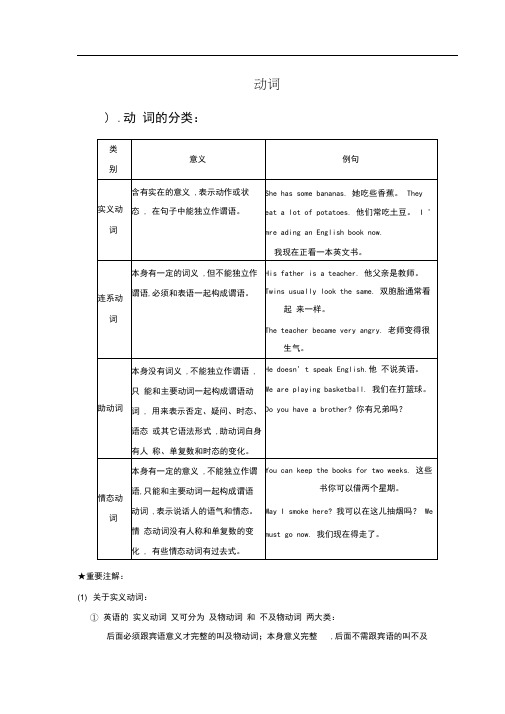
动词) .动词的分类:★重要注解:(1) 关于实义动词:①英语的实义动词又可分为及物动词和不及物动词两大类:后面必须跟宾语意义才完整的叫及物动词;本身意义完整,后面不需跟宾语的叫不及物动词。
②有些动词通常只作不及物动词。
如:go,come,happen,lie,listen,rise,arrive,hall 等。
有些动词通常用作及物动词。
如:say, raise, lay, find, buy 等。
③大多数动词可以兼作及物动词和不及物动词。
如:study, sing 等。
④有些动词作及物动词与作不及物动词时的意义有所不同。
如:know, wash 等。
⑤有些动词常和介词、副词或其它词类一起构成固定词组, 形成短语动词。
如:listen,reply,wait,look .(2)关于连系动词:①连系动词用来连接主语和表语,连系动词后面常为形容词。
②常见的连系动词有:be、become、look 、feel、sound 、smell 、taste、seem、turn 、grow 、get、go、fall 、sit、stand 、lie 等。
③有些连系动词来源于实义动词,意思也跟着变化:look(看→看起来)、feel(感觉、摸→感到)、smell(闻、嗅→闻起来)、taste (尝→尝起来)、turn (翻转、转动→变得)、grow(生长→变得)、get(得到、到达→变得)、go(去→变得),所不同的是,作为实义动词时,后面不能跟形容词。
[注释] become 、get 、go、be、grow 、turn 的用法区别:become 表示“变成”比,较正式, 通常不用将来时表示动作已经完成。
get 也表示动作已经完成,但是更加口语化,通常表示温度、时间、岁数等变化。
go 表示“变得”常,见于某些短语中,后面常有形容词bad、blind 、hungry 等。
be 表示“是、成为、当”多,用于将来时、祈使句或不定式中。
初中英语常用动词归纳

It’s getting warmer and warmer
d. 与always, constantly, forever 等词连用,表示反复发生的动作 或持续存在的状态,往往带有说话人的主观色彩.
You are always changinge lived in Beijing? 备注:暂时性动词不能与for…, since…,How long…等
表示段时间 的短语同时使用。
现在完成时的基本用法:
1.表示过去发生的动作对现在造成的影响或结果。 标志词:already(用于肯定句)、yet(用于否定句)、ever、never、 just、before等。
since five years ago
3.瞬间动词:一时的动作,不能与表示延续性的时间状语连用。
begin. go. come. leave. buy. arrive. give. find.
I am doing my homework now. 注意: start,leave,go,come等的一般现在时可表示按 规定要发生 的未来动作,如列车将离开。
练习
( ) 1 -_C____ they often ___ these old men?
-Yes, they___.
A. Do; help; are
2) 客观真理,客观存在,科学事实。
The earth moves around the sun. Shanghai lies in the east of China.
3) 表示格言或警句中。
Pride goes before a fall. 骄者必败。 4) 现在时刻的状态、能力、性格、个性。
英语动词所有用法梳理!动词不定式、情态动词、主动被动

1动词原形及不定式的用法动词原形的用法1.除单三人称的一般现在时,其它人称作主语,动词用原形。
2.将来时态shall, will, should, would之后用动词原形。
3.祈使句句子开头用动词原形。
4.助动词do, does, did之后用动词原形。
5.情态动词can、could、may, might, have/has to, must, need, dare ,ought to之后用动词原形。
6.使役动词let、make、have 之后用动词原形。
7.感官动词see、watch、notice、hear、feel、find之后用动词原形(说明动作已经结束)。
8.had better 之后用动词原形。
9.why / why not 之后用动词原形。
10.would rather dosth . than do sth .11.prefer to dosth. rather than do sth./ prefer doing sth. to doing sth.动名词的用法1.介词之后动词要用动名词形式(动词+ing)2.部分动词之后的动词只能用动名词形式:enjoy, finish, practice, mind, spend,dislike, find , keep3.部分短语后省略了介词in: have fun/ problems/ difficulties/trouble /a good time doing be busy doing,4.be worth doing, can’t help doing , feel like doing , do some doing sth.5.下面这些动词既可跟动名词又可跟不定式:like / love / hatedoing (doing表示习惯)(to do表示具体的动作)stop doing(表示停止)(doing表示开始做不定式的动作);remember , forget (不定式表示未做;动名词表示已做);try (doing表示试着做;to do表示努力做);go on (doing继续做相同的事to do继续做不同的事)begin , start (to do与doing区别不大);need (人作主语用to do ;物作主语用doing表示被动);mean(人作主语用to do表示“打算做”;事/ 物作主语用doing表示“意味着”);这些动词既可跟动词原形,又可跟ing形式:see,watch,hear.notice (用原形是指动作结束,ing 表示动作正在进行)动词不定式的用法1.ask/tell/want/order/teach/wish/wouldlike/invite/encourage sb. to do sth.2.ask/tell/want/order/teach/wish/wouldlike/invite/encourage sb. not to do sth.3.Help...(to) dosth.4.主系表+ 不定式(to do)5.主系表+for sb + 不定式(to do)6.部分动词既可跟动名词又可跟不定式:(同动名词6)7.疑问词+不定式(to do)可以把复合句变为简单句,(to = 主语+will/would/can)2英语动词双写规则及常见动词英语动词双写规则必须同时满足以下4 个条件1) 该动词的发音以重读闭音节结尾;重读闭音节就是指在一个音节中,元音字母不是发它本身的字母音,以辅音字母结尾,而且是重读音节的音节。
英语中动词的用法总结

(一)动词概述动词是表示人或事物的动作、存在、变化的词。
根据其词义和其在谓语中的作用可分为实义动词、助动词和情态动词。
根据其在句子中的功用可分为及物动词,不及物动词和连系动词。
1)实义动词:意义完全,能独立用作谓语。
如:enable,watch,run,open等。
2)连系动词:是一个表示谓语关系的动词。
它必须在后面接表语(通常为名词或形容词)。
如:seem,look,smell,taste,sound,get,become,turn,be等。
3)助动词:本身没有词汇意义。
不能单独用作谓语。
在句中与实义动词一起构成各种时态、语态、语气以及否定和疑问结构。
如:do,does,did等。
4)情态动词:词义不完全。
在句中不能单独作谓语,只能与实义动词一起构成谓语。
如:can,may,must,need,ought to等。
(二)动词的时态1.动词的时态一共有16种,以ask为例,将其各种时态的构成形式列表如下:现在时过去时将来时过去将来时一般ask / asks asked shall/will ask should/would ask进行am/is/are asking was/were asking shall/will be asking should/would be asking 完成have/has asked had asked shall/will have asked should/would have asked完成进行have/has beenaskinghad been askingshall/will have beenaskingshould/would have beenasking1)一般现在时:概念:经常、反复发生的动作或行为及现在的某种状况。
时间状语:always, usually, often, sometimes, every week (day, year, month…), once a week, on Sundays, etc.基本结构:①be动词;②行为动词否定形式:①am/is/are+not;②此时态的谓语动词若为行为动词,则在其前加don't,如主语为第三人称单数,则用doesn't,同时还原行为动词。
_初中英语动词考点归纳

初中英语动词考点归纳一、+do+to do+doing动词ing形式1. keep doing sth. 坚持做某事2.hold on to doing sth. 坚持做某事3. practise doing sth. 练习做某事4. enjoy doing sth. 喜欢做某事5. finish doing sth. 完成做某事6. be afraid of doing sth. 害怕做某事7. be busy doing sth. 忙于做某事8. look forward to doing sth. 盼望做某事9. spend ... (in)doing sth. 花...做某事10. stop/keep/prevent …from doing sth. 阻止某人做某事11. thank sb for doing sth. 感谢某人做某事12. mind doing sth. 介意做某事13. can’t help doing sth. 情不自禁做某事14. have difficulty/problem/trouble doing sth. 做某事有困难15. instead of doing sth. 代替做某事16. pay attention to doing sth. 集中精力做某事17. suggest doing sth. 建议做某事18. It’s time for doing sth. 到该做某事的时间19.It’s time to do sth. 到该做某事的时间了20. be used to doing sth. 习惯做某事21.be used for doing sth. 被用来做某事22. allow doing sth. 允许做某事23. put off doing sth. 推迟做某事24. succeed in doing sth. 成功做某事25. end up doing sth. 以做某事结束26. give up doing sth. 放弃做某事二、不带to的动词不定式1. had better (not) do sth. 最好(不)做某事2.let sb do sth. 让某人做某事3.make/have sb. do sth. 使某人做某事三、动词to do形式1. It’s time to do sth. 该是做某事的时候了2. It takes sb. some time to do sth. 做某事花了某人时间3. encourage/invite/ sb. to do sth. 鼓励/邀请某人做某事4. It’s+ adj+ for sb. to do sth. 做某事对某人5.It’s + adj.+ of sb. to do sth. 某人做某事6. decide/wish/to do sth. 决定/希望做某事7. prefer to do rather than do sth. 宁愿做某事而不愿做某事8. can’t wait to do sth. 迫不及待做某事9. be afraid/ready/able to do sth. 害怕/准备/能够做某事10. refuse to do sth. 拒绝做某事11. warn sb. to do sth. 告诫某人做某事12. pretend to do sth. 假装做某事13. teach/learn to do sth. 教做某事、/学习做某事14. need to do sth. 需要做某事15. be willing to do sth. 愿意做某事16. try to do sth. 努力做某事17.try one’s best to do sth. 尽某人最大努力做某事18. agree to do sth. 同意做某事19. seem to do sth. 好像似乎做某事20. plan to do sth /make a plan to do sth. 计划做某事21. in order to do sth. 为了做某事22. have a chance to do sth. 有机会做某事23. be anxious to do sth. 渴望做某事24. afford to do sth. 支付得起做某事四、两个动词连用,表目的1. used to do sth. 过去常常做某事2.be used to do sth. 被用来做某事e sth. to do sth. 用某物做某事4. be supposed to do sth. 应该做某事5. allow sb to do sth. 允许某人做某事6.sb be allowed to do sth. 某人被允许做某事7. the best way is to do sth. 最好的方法是做某事8. the next step is to do sth.下一步是做某事9. have an opportunity to do sth. 有机会做某事10. the first thing is to do sth. 第一件事是做某事11. it’s best to do sth. 最好做某事12. it’s a good time to do sth. 这是做某事的最好时间13. be sure to do sth. 一定会做某事14. urge sb to do sth. 催促某人做某事15. order sb to do sth. 命令某人做某事16.offer to do sth. 主动提供做某事17. invite sb to do sth. 邀请某人做某事18. expect to do sth. 期望做某事19. volunteer to do sth. 志愿做某事20. it’s one’s duty to do sth. 做某事是某人的责任五、既带to的动词不定式又带ing形式1. stop to do/ doing sth. 停下来做另一件事/停止做某事2. forget to do/ doing sth. 忘记去做某事/忘记做过某事3. remember to do/doing sth. 记住去做某事/记得做过某事4. go on to do/doin sth. 继续做另一件事/继续做某事5. like to do/doing sth. 喜欢做某事6. love to do/doing sth. 喜欢做某事7. prefer to do/doing sth. 更喜欢做某事8. hate to do/doing sth. 讨厌做某事六、既带to的动词不定式又用现在分词用不带to的动词不定式强调动作的完成过程;用现在分词强调动作的进行状态。
初中英语常用的动词用法
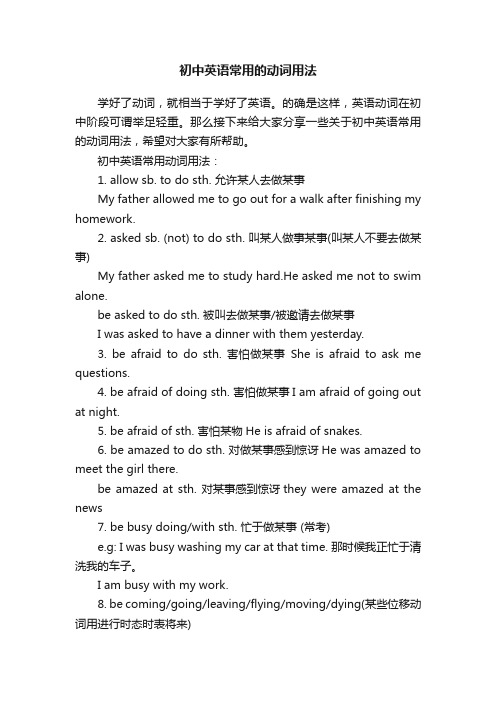
初中英语常用的动词用法学好了动词,就相当于学好了英语。
的确是这样,英语动词在初中阶段可谓举足轻重。
那么接下来给大家分享一些关于初中英语常用的动词用法,希望对大家有所帮助。
初中英语常用动词用法:1. allow sb. to do sth. 允许某人去做某事My father allowed me to go out for a walk after finishing my homework.2. asked sb. (not) to do sth. 叫某人做事某事(叫某人不要去做某事)My father asked me to study hard.He asked me not to swim alone.be asked to do sth. 被叫去做某事/被邀请去做某事I was asked to have a dinner with them yesterday.3. be afraid to do sth. 害怕做某事She is afraid to ask me questions.4. be afraid of doing sth. 害怕做某事I am afraid of going out at night.5. be afraid of sth. 害怕某物He is afraid of snakes.6. be amazed to do sth. 对做某事感到惊讶He was amazed to meet the girl there.be amazed at sth. 对某事感到惊讶they were amazed at the news7. be busy doing/with sth. 忙于做某事 (常考)e.g: I was busy washing my car at that time. 那时候我正忙于清洗我的车子。
I am busy with my work.8. be coming/going/leaving/flying/moving/dying(某些位移动词用进行时态时表将来)the bus is coming/the dog is dying.9. be excited to do sth. 对做……感到兴奋Jacky was excited to travel there by plane.be excited at sth.Lily was excited at his words.be excited about doing sth.he was excited about passing the exam without going overing books.10. be frightened to do sth. 害怕去做某事Sam is frightened to ride a horse.11. be glad/happy to do sth. 高兴去做某事she is happy to clean the blackboard with me.be pleased to do sth. 高兴做某事she was pleased to help the old man yesterdaybe pleased with sth. 对某事感到高兴/满意the teacher was pleased with my answer.12. be interested in sth./doing sth. 对某事感兴趣/对做某事感兴趣she is interested in swimming in the river.My brother is interested in Chinese.13. be/get ready for/to do sth.Be ready for sth. 为某事做好了准备We are ready for the exam.Be ready to do sth. 为做某事做好了准备We are ready to have a birthday party for her.get ready for sth.为某事在做准备We are getting ready for the exam.13. be sorry to do sth. 对做某事感到抱歉14. be surprised to do sth. 对做某事感到惊奇be surprised at sth. 对某事感到惊奇15. be worth doing sth. 值得做某事 (worth 后接动词-ing形式,常考)16. begin to do sth.begin/start to do/doing sth.17. can/be able to afford (to buy) sth. 有能力购买(供)……18. can/may/must do sth. could/would/should/might do sth.19. can't wait to do sth. 迫不急待地去做某事20. decide to do sth. 决定去做某事make up one's mind to do sth. 下决心去做某事 (常考)make a decision to do sth. 对做某事作出决定21. deserve to do sth. 值得/应该做……22. encourage sb. to do sth.鼓励某人去做某事23. enjoy doing sth. 乐意去做某事24. expect (sb.) to do sth. 期望去做某事25. fail to do sth. 做某事失败succeed doing sth. 成功做了某事26. finish doing sth. 做完某事(后接动词-ing形式) (常考)27. follow sb to do sth. 跟随某人去做某事28. get sb. to do sth.make sb. do sth.let sb. do sth.29. get/have a chance to do sth.得到一个做某事的机会30. give/pass/show/lend/sell sb. sth./ sth. to sb.buy/get/bring sb. sth. / sth. for sb.31. go on to do sth. 继续做事(常考)go on doing sth. 继续做事(常考)32. hate to do/doing sth. 讨厌/不喜欢做某事33. have fun doing sth.34. have problems doing sth.做某事遇到困难35. have sb. do sth.have sth. donehave sth. to do 有事要做36. hear sb. do sth. 听到某人做某事(后接动词原形,常考)hear sb. doing sth. 听到某人正在做某事(常见)37. help to do sth. 帮忙做某事help sb. (to) do sth. 帮助某人做某事38. hope/wish to do sth. 希望做某事wish sb. to do sth. 希望某人做某事39. I t seems that 这像是……(后接从句)seem to do sth.seem +adj.40. It's + adj.+(for sb.) to do sth.It's + adj. +(of sb.) to do sthe.g: It's glad for him to hear the news.41. It takes sb. some time/money to do sth. 花费某人多长时间做某事(常考)42. pay …for…costspend…on…..it take …to do sth.43. It's best for sb to do sth.. 对某人来说做某事是最好的had better do sth. 最好做某事 (注意had没有时态和人称的变化,better后接动词原形)44. It's time for sb. to do sth. 是某人做某事的时候了45. keep (on)doing sth. 坚持做某事(常考)keep sb. doing sth. 让某人做某事(常考)keep sb. from doing sth. 阻止某人做某事(常考)keep sb./ sth. +adj.keep the book for 2 days 借这本书两天(不要用borrow或lend)46. learn to do sth. 学做某事learn sth. from sb. 向某人学习47. like to do/doing sth. 喜欢做某事like sb. to do sth. 喜欢某人做某事48. need to do sth.need doing sth./to be doneneed sth .needn't do sth.49. prefer to do sth. rather than do sth. 宁愿……而不愿……(常考)prefer doing sth. to doing sth. 喜欢做……胜过做……e.g: I prefer reading books to going shopping. 比起购物来,我更爱读书。
- 1、下载文档前请自行甄别文档内容的完整性,平台不提供额外的编辑、内容补充、找答案等附加服务。
- 2、"仅部分预览"的文档,不可在线预览部分如存在完整性等问题,可反馈申请退款(可完整预览的文档不适用该条件!)。
- 3、如文档侵犯您的权益,请联系客服反馈,我们会尽快为您处理(人工客服工作时间:9:00-18:30)。
初中英语常用动词习惯用法总结1. allow sb to do sth 允许某人去做某事(后接动词不定式)My f ather allowed me to go out for a walk after finishing myhomework .2. asked sb (not) to do sth 叫某人做事某事(叫某人不要去做某事)My father asked me to study hard.He asked me not to swim alone.be asked to do sth被叫去做某事/被邀请去做某事I was asked to have a dinner with them yesterday . 3. be afraid to do sth 害怕做某事She is afraid to ask me question s.4. be afaid of doing sth 害怕做某事I am afraid of going out at night.5. be afaid of sth 害怕某物He is afraid of snakes.6. be amazed t o do sth 对做某事感到惊讶He was amazed t o meet the girl there.be amazed at sth对某事感到惊讶they were amazed at the news.7. be busy doing/with sth忙于做某事(常考)e.g: Iwas busy washing my car at that time. 那时候我正忙于清洗我的车子。
I am busy with my work.8. be coming/g oing/lea ving/fiy ing/movi ng/dying (某些位移动词用进行时态时表将来)the bus is coming/t he dog is dying. 9. be excited to do sth对做……感到兴奋 Jacky was excited to travel there by plane.be excited at sthLily was excited at his words.be excited about doing sthhe was excited about passing the exam without going overing books. 10. be frighten ed to dosth 害怕去做某事Sam is frighten ed to ride a horse. 11. be glad/hap py to dosth 高兴去做某事sheis happyto clean the blackboar d with me.be pleasedto do sth 高兴做某事she was pleased to help the old man yesterday .be pleased with sth 对某事感到高兴/满意the teacher was pleasedwith my answer.12. be interest ed in sth/doin g sth 对某事感兴趣/对做某事感兴趣she is interested in swimming in the river.My btotheris interested in Chinese.13.be/get readyfor/to do sthBe ready for sth 为某事做好了准备We are ready for the exam. Be ready to do sth 为做某事做好了准备Weare ready to have abirthday party for her.get ready for sth为某事在做准备We are getting ready for the exam.get ready for sth 为做某事而做准备13. be sorry to do sth 对做某事感到抱歉14. be surprise d to do sth对做某事感到惊奇be surprised at sth 对某事感到惊奇15. be worthdoing sth 值得做某事(worth 后接动词-ing形式,常考)16. begin to dosth开始去做某事begin/ start to do/doing sth17. can /be able to afford (to buy) sth 有能力购买(供)……18. can /may/mus t do sth could/wo uld/shou ld/might do sth 19. can ’t waitto do sth 迫不急待地去做某事20. dec ide to do sth决定去做某事makeup one’s mind to do sth 下决心去做某事(常考)make a decisionto do sth 对做某事作出决定21. des erve todo sth 值得/应该做……22. enc ourage sb to do sth 鼓励某人去做某事23. enj oy doing sth乐意去做某事24. exp ect (sb) to do sth 期望去做某事25. fai l to do sth 做某事失败succee d doing sth 成功做了某事26. fin ish doing sth做完某事(后接动词-ing形式)(常考)27. fol low sb to do sth跟随某人去做某事28.让某人做某事(后接动词原形)get sb to do sthmake sb do sthlet sb do sth 29. get /have a chance to do sth 得到一个做某事的机会30. giv e/pass/show/lend /sell sb sth/sth to sbbuy/get/b ring sb sth/sth for sb 31. go on to dosth 继续做事(常考)go on doing sth 继续做事(常考)32. hate todo/doing sth 讨厌/不喜欢做某事33. hav e fun doing sth 34. haveproblems doing sth 做某事遇到困难35. have sb dosthhave sth donehave sth to do工有事要做36.hea r sb dosth听到某人做某事(后接动词原形,常考)hear sb doing sth 听到某人正在做某事(常见)37. hel p to do sth 帮忙做某事helpsb (to) do sth帮助某人做某事38. hop e/wish to do sth 希望做某事wish sb to do sth 希望某人做某事39. I t seems that 这像是……(后接从句)seem to do sthseem +adj 40. It’s +adj+(for sb) to do sth .It’s+adj +(of sb)to do sthe.g: It’s glad for him to hear the news. 41. It takes sb some time/mon ey to dosth . 花费某人多长时间做某事(常考)42. pay …for…cost spend…on….. ittake …to do sth 43. It’s best for sb to do sth. 对某人来说做某事是最好的had better dosth 最好做某事(注意had没有时态和人称的变化,better 后接动词原形)44. It’s time for sb todo sth是某人做某事的时候了45. kee p(on)doing sth坚持做某事(常考)keep sb doing sth 让某人做某事(常考)keep sb from doing sth 阻止某人做某事(常考)keepsb/sth+adjkeep the book for 2 days 借这本书两天(不要用borrow 或lend)46. lea rn to do sth学做某事learn sth from sb 向某人学习47. like todo/doingsth 喜欢做某事like sb to do sth 喜欢某人做某事48. need to do sth需要做某事need doingsth/to be doneneed sth needn’t do sth 49. pre fer to do sth rather than do sth 宁愿……而不愿……(常考)prefer doing sthto doing sth 喜欢做……胜过做……e.g: I prefer reading books to going shopping. 比起购物来,我更爱读书。
prefer to do sth 喜欢(爱)做某事50. ref use to do sth 拒绝做……51.(常考)remember/ forget to do sth记得/忘记做某事rememb er/forget doing sth 记得/忘记做过某事52. see sb do sth 看见某人做某事(结果)see sb doing sth 看见某人正在做某事(正在进行中)be seen to do sth 做某事被看见53. som ething to eat/drink 一些吃/喝的东西(词不定式放在somethin g等后修饰这些词)e.g: I need somethin g to eat. 我要一些吃的东西。
54. spe nd some time (in)doin g sth /on sth 花费时间做某事(注意动词要用ing形式)(常考)spend some money on sth/doing sth 买……花了多少钱55. Sthishard/dif ficult/e asy to do . 做好某事很难/容易56.sto p to do sth停下来去某事(两件事)(常考)stopdoing sth 停止做某事(一件事)(常考)stop sb (from)doing sth 阻止某人做某事(常考)57. take turnsto do sth 轮流做……58. tell sb (not) to do sth 叫某人去(不要)做某事betold to do sth被告知不要做某事59. The re is noneed (for sb) to do sth对某人来说没必要做某事60. The re is no time (for sb ) to do sthhaveno time to do sth没时间做某事61. too …(for sb) to …太……以致不能……so…that…not…enough to doe.g: The boy is too young to go to school.那男孩太小了以致不能上学。
